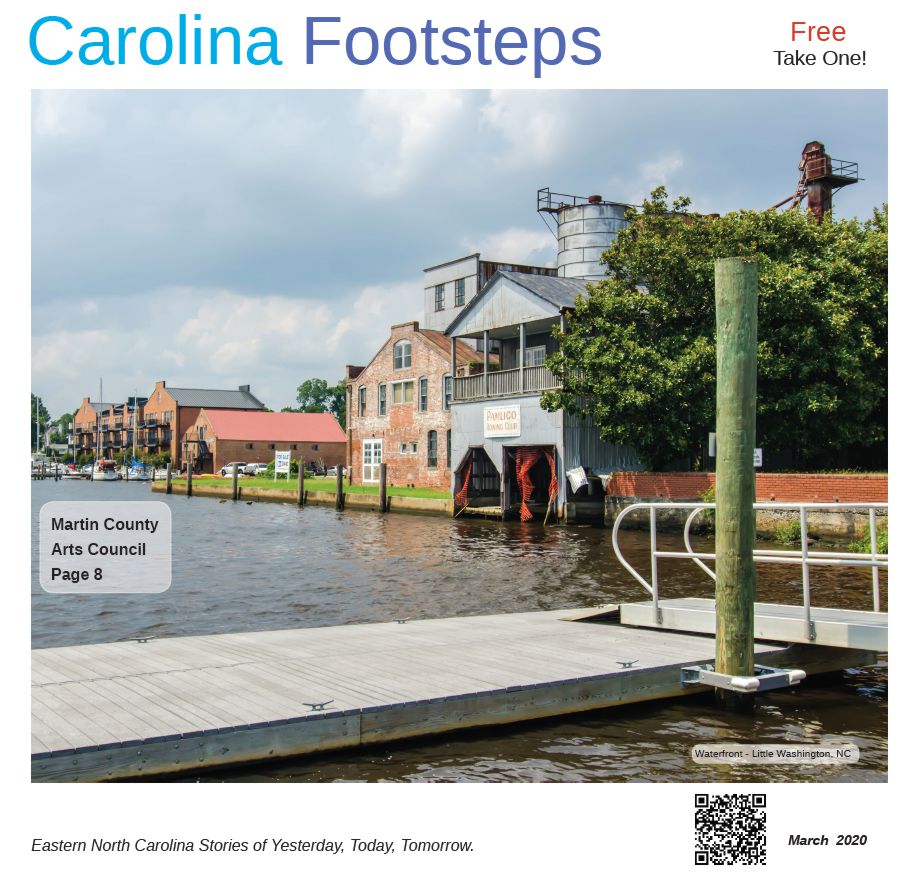Another view: Bar is judge, jury, executioner against Tillett
By Submitted Story on January 11, 2016
Nags Head Attorney Neil W. Scarborough submitted the following article for publication in The Outer Banks Voice.
The third part examines the State Bar’s conduct in more detail and reveals the injustice they’re not only perpetrating but are trying to hide.
All the court documents and other materials related to this case are available for review at www.scarboroughlawfirm.com.
Jeopardy
Like our sister states and the federal government, North Carolina’s government consists of three branches: the executive, the legislative and the judicial.
Also like our sister states and the federal government, the three branches are independent, meaning no branch can impede, interfere with or control the others except as expressly permitted by the N.C. Constitution. [13]
The North Carolina State Bar was created by the General Assembly in 1933 [14] as an agency of the legislative branch. It was formed to enable the bar to provide more effective service to the public by, among other things, giving the Bar authority to control admission to practice and to discipline attorneys for misconduct. [15]
In short, the primary purpose of the State Bar is and always has been to regulate those who practice law in the State.
The Bar has authority to discipline attorneys only if their conduct results in or involves one of the following:
- Conviction or plea of guilty or no contest to a criminal offense showing professional unfitness;
- Violation of the Rules of Professional Conduct; or
- Knowing misrepresentation of any facts or circumstances surrounding any complaint, allegation or charge of misconduct issued by or in the name of the Bar. [16]
The Model Rules of Professional Conduct are just what they say they are, rules and guidelines that practicing attorneys are to follow, the violation of which can result in discipline by the State Bar.
By contrast, the discipline of lawyers serving as judges is provided for by a separate regulatory scheme altogether.
Whereas attorneys are subject to the Code of Professional Conduct and the discipline of attorneys is to be handled by the State Bar, judges are subject to the Code of Judicial Conduct, and the discipline of judges is to be handled by the N.C. Judicial Standards Commission.
This regulatory scheme isn’t a minor detail; it was established pursuant to express Constitutional mandate.[18] General Statute §§ 7A-374.1 – 378, which created the Judicial Standards Commission, was the General Assembly’s answer to that mandate. It expressly provides that “the procedure for discipline of any judge or justice of the General Court of Justice shall be in accordance with this Article” (emphasis added). [19]
Turning back to the complaint against Judge Tillett, the Bar therefore faces at least four insurmountable hurdles in its attempt to discipline him — and we haven’t gotten to “double jeopardy” yet.
In the first place,Tillett is a judge and thus, a member of the judicial branch. As mentioned above, our three branches of government are independent and may not interfere with one another in the absence of express authorization by the Constitution.
And the Constitution contains no exception that would even arguably allow the Bar to regulate the judicial branch. Consequently, the State Bar, as an agency of the legislative branch, does not have authority to discipline Tillett, an officer of the judicial branch.
Second, even assuming that the legislature may regulate the judiciary, it wouldn’t make a bit of difference in this case: N.C. Gen. Stat. § 7A-374 expressly provides that the exclusive procedure for disciplining judges is before the Judicial Standards Commission, and our Supreme Court has held that it has exclusive original jurisdiction over such claims. [20]
Consequently, the State Bar doesn’t have jurisdiction to discipline Tillett.
Third, let’s assume for the sake of argument that the Bar does, in fact, have authority to discipline Tillett.
In that case it must allege that Tillett has engaged in one of the three types of conduct listed above for which the Bar may impose discipline.
The Bar went with door number two, alleging that Tillett violated the Rules of Professional Conduct by engaging in conduct “prejudicial to the administration of justice.”
The problem with this theory is that the Rules of Professional Conduct only apply to attorneys; that is, lawyers engaged in the private practice of law. Judges are not attorneys; in fact, judges are forbidden from practicing law by statute. [21]
As discussed above, judges are subject to the Code of Judicial Conduct, and the discipline of judges is the exclusive province of the Judicial Standards Commission, not the State Bar.
The fourth and final problem with the theory is also proof of how far the responsible parties are willing to go to harm Tillett.
Again, Tillett’s alleged wrongdoing is engaging in conduct “prejudicial to the administration of justice.” [22]
Vagueness aside, in this case the charge against Tillett is ludicrous on its face.
Tillett requested the DA to investigate the conduct of a police chief against whom multiple complaints had been filed by his own officers — including at least four who filed lawsuits against him and KDH.[23]
Kill Devil Hills Town Attorney Steven Michael effectively stopped the investigation. For Michael to then accuse Tillett of engaging in conduct prejudicial to the administration of justice is the proverbial pot calling the kettle black: In my limited experience, if anyone is engaged in conduct prejudicial to the administration of justice, it is the person who stops an investigation, not the one calling for an investigation.
A likely counterargument is that the State Bar and the Judicial Standards Commission have “concurrent” jurisdiction, meaning that either agency can hear a complaint against a judge.
In the first place, that wouldn’t explain how Tillett can be disciplined for the same conduct twice, once by each agency.
A second more fundamental and telling problem is the most obvious: the General Assembly wouldn’t have gone through the trouble of creating a Judicial Standards Committee, adopting Rules of Judicial Conduct and enacting an entire statutory procedure for the discipline of judges if the State Bar already authority to do the job.
Finally,the argument that the Bar and the JSC have concurrent jurisdiction leads to a specific legal problem for the Bar, which is discussed in more detail in the next section.
But if the Bar doesn’t have authority to discipline Tillett (and it does not), then how are they doing it? Simply put, because they can.
In a twist that turns irony on its head, the State Bar is literally judge, jury and executioner: It makes the laws; it “charges” people for violating the laws; it selects the judge and jury to try the case; it decides the case; and it then imposes a sentence of its choosing.
There are no “checks” or “balances,” no oversight from an outside agency. Everything hinges uon the character and honesty of those involved, and if there’s one point to take away from this case it’s that any such trust is misplaced.[24] In what government would the practicing bar be permitted to discipline judges?
The obvious answer is “none.” but when the agency attempting to discipline a judge is permitted to determine whether it has authority to do so, the inevitable answer is “North Carolina,” making it the only sovereign State in the western world to have earned the distinction.
And don’t think for a second that the Bar only appears to be manipulating the rules. The first lines of the complaint against Tillett belie the truth: well aware that Tillett isn’t an attorney, at no point in the 11-page complaint does the drafter allege that Tillett is engaged in the practice of law [25] – yet it is careful to append “attorney” after Tillett’s name in the caption.
Double jeopardy
Recall the second question posed at the end of the last section: In what government could a sitting judge be disciplined for the same conduct twice?
Once again, “North Carolina” would appear to be the only sovereign State in the western world to have earned the distinction. But this time Tillett will have earned a distinction as well: He’ll be the only sitting judge to have been disciplined by the State Bar in the more than 80 years of its existence.
Part of the reason why that’s the case was discussed in the last section; the other part will be addressed here.
Some readers may not have been aware that this is the second time Tillett has faced discipline on the basis of the same facts.
The first Complaint against him was filed in 2011 with the Judicial Standards Commission, where it was alleged that his conduct violated the Rules of Judicial Conduct by engaging in conduct “prejudicial to the administration of justice.”
After two years of defending against the allegations, Tillett decided to admit certain facts and, as they say, take his medicine.
He did so, however, not because the allegations were true but only to bring an end to what had become a lengthy and expensive battle [26] — I know this because I was among those who counseled him to go that route.
Of course, neither I nor anyone else involved had any idea that Michael would file another complaint against him with the State Bar; indeed, we all knew that wasn’t “possible.”
The Complaint filed against Tillett with the Bar is not only based upon the same facts that formed the basis for the Complaint with the Judicial Standards Commission but is also based upon the same claim; namely, that Tillett’s conduct was “prejudicial to the administration of justice.” [27]
This is important in more ways than one.
Ordinarily, when a fact is found or admitted to be true in one legal proceeding it is taken to be established in any other proceeding and cannot be refuted. The doctrine is known as “issue preclusion” or “collateral estoppel,” and it makes good sense.
It’s a rule of fairness intended to protect the integrity of the judicial process by preventing relitigation of the same facts.
Since Tillett stipulated to certain facts in the proceedings before the Judicial Standards Commission, he would therefore ordinarily be estopped from disputing those facts in the proceedings before the State Bar.
But there’s a flip side.
Pursuant to the same principle, when a decision is reached in one legal proceeding the claim has been adjudicated and cannot be relitigated.
The doctrine is called Res Judicata or “claim preclusion,” akin to the 5th Amendment protection against “double jeopardy,” and it serves the same purpose as collateral estoppel.
Since the claims against Tillett have already been adjudicated in the proceedings before the Judicial Standards Commission, the State Bar would therefore ordinarily be estopped from bringing the claims against him a second time. [26]
That is, of course, if we weren’t in the land of Oz.
The Bar is attempting to have its cake cake and eat it too: It’s attempting to use Tillett’s admissions in the previous proceedings against him in the second when, ironically, the principle it claims to prevent Tillett from refuting the facts in the second proceedings is the same principle that should prevent it from disciplining him a second time! [27]
Put another way, the Bar wants the facts in the proceedings before the Judicial Standards Commission to be deemed established but the claims in the proceedings before the Judicial Standards Commission not to be deemed established, because to hold otherwise would mean that the Bar is precluded from disciplining Tillett a second time, which is simply unacceptable.
And that’s not the end of it. The Bar is going one step further in this case by attempting to avoid creating any record of its conduct.
If the Bar has its way, the “record” will consist of a Complaint, an Answer, and an adjudication — next to nothing in between, and nothing explaining how and why they did what they’re doing. And that’s for good reason, if you’re the Bar.
In the first place it appears the Bar wants to keep the whole affair in the dark so that as few people as possible know what it’s doing. In the second place, it appears the Bar wants to make it difficult for anyone to figure out what it’s done after it’s done it.
That’s because in deciding an appeal from a lower “court,” the appellate court is generally limited to reviewing the decision for legal errors; that is, whether the lower court applied the correct law and applied it correctly.
The less of a record the Bar creates of how it reached its decision the more difficult it will be for an appellate court, in this case the North Carolina Supreme Court, to determine whether the Bar made legal errors.
So how is the Bar attempting to avoid creating a record?
Well, in response to the Bar complaint, Tillett filed motions that raised many of the points mentioned in this article, points which preclude the Bar from proceeding against him.
The Bar’s response?
It summarily denied the motions without a hearing — meaning there’s no record.
Meanwhile, as mentioned earlier, the Bar filed a motion for summary judgment contending that the doctrine of res judicata precludes Tillett from refuting any of the admissions he made in the proceedings before the Judicial Standards Commission.
A motion for summary judgment is a procedural mechanism whereby the moving party argues that there are no genuine issues of fact in dispute and that it is entitled to judgment as a matter of law. If the motion is allowed, you guessed it, there’s no hearing; they win without so much as a whimper, let alone a fight.
And that’s exactly what happened: on Dec. 10, the Bar allowed its own motion for summary judgment, ruling that Judge Tillett is precluded by the doctrine of res judicata from refuting the admissions made before the Judicial Standards Commission. Simultaneously the Bar denied Tillett’s motion for summary judgment, in which he argued that res judicata precludes the Bar from prosecuting him a second time.
Conclusion
Recently Tillett and the Bar, through counsel, sat down for an impromptu meeting to discuss the possibility of settling the case.
When asked what the Bar would be willing to accept to settle, Tillett was told that Bar would accept nothing short of his resignation.
This brings to light the likely motivation behind the Bar Complaint: One of them wants Tillett’s seat on the Superior Court.
And there’s no better time than now to make such a “move.”
With Michael and Baker’s political connections, one of them is virtually assured of getting appointed to Tillett’s seat — or perhaps the seat of J.C. Cole, our other Superior Court judge, who will likely be retiring soon. [28]
I’ll close with this, which seems fitting: Article I, Section 14 of the N.C. Constitution reads, “Freedom of speech and of the press are two of the great bulwarks of liberty and therefore shall never be restrained, but every person shall be held responsible for their abuse.” (emphasis added).
Let’s hope so.
Footnotes:
[13] It’s a basic, bedrock principle of American Constitutional law known as “separation of powers.” “The legislative, executive, and supreme judicial powers of the State government shall be forever separate and distinct from each other.” Article I, Section 6 of the North Carolina Constitution. “The judicial power of the State shall, except as provided in Section 3 of this Article, be vested in . . . a General Court of Justice. The General Assembly shall have no power to deprive the judicial department of any power or jurisdiction that rightfully pertains to it as a co-ordinate department of the government. . .” Article IV, Section 1 of the North Carolina Constitution.
[14] N.C. Gen. Stat. § 84-15 et seq.
[15] Baker v. Varser, 240 N.C. 260 (1954).
[16]N.C. Gen. Stat. § 84-28(b)
[17] The American Bar Association, Status of State Review of Professional Conduct Rules as of September 14, 2011. http://www.americanbar.org/content/dam/aba/migrated/cpr/pic/ethics_2000_status_chart.pdf-63k-2012-09-07; see also, Rotunda, Ronald D., Legal Ethics: the Lawyer’s Deskbook on Professional Responsibility § 1-1(f) (2015-2016 Ed.)
18] “The General Assembly shall prescribe a procedure for . . . the censure and removal of a Justice or Judge of the General Court of Justice for willful misconduct in office . . . or conduct prejudicial to the administration of justice. . .”N.C. Constitution, Article IV § 17
[19] N.C. Gen. Stat. § 7A-374.1. See also, In re Hardy, 294 N.C. 90 (1978); In re Renfer, 345 N.C. 632 (1997), in which the court noted that “original jurisdiction to discipline judges lies solely within the Supreme Court by virtue of statutory authority.”
[20] In re Renfer, 345 N.C. 632 (1997), in which the court noted that “original jurisdiction to discipline judges lies solely within the Supreme Court by virtue of statutory authority.”
[21] N.C. Gen. Stat. § 84-2: “No . . . judge . . . shall engage in the private practice of law.”
[22] Language one commentator has described as “too vague and loose to be a criterion in a legal code” and about which another said, “there is a basic unfairness in asserting the power to take away one’s livelihood, one’s ability to practice law, practice law, based on a standard so undefined, vague, and amorphous that it varies with the eyes of the beholder.” Rotunda § 8.4-2(e)
[23] And the allegations against Britt, even if only partly true, beg the question why Tillett or KDH officials haven’t long since removed him from office.
[24] “If men were angels, no government would be necessary. If angels were to govern men, either external nor internal controls on government would be necessary. In framing a government which is to be administered by men over men, the great difficulty lies in this: you must first enable the government to control the governed; and in the next place oblige it to control itself.” Madison, James, The Federalist Number Papers 51 (1787).
[25] Indeed, the drafter alleges that Tillett “at all relevant times a Superior Court Judge”)
[26] Anyone who has ever been involved with litigation can no doubt sympathize.
[27] Although the Bar Complaint is based on the allegation that Tillett violated the Rules of Professional Conduct (RPC), whereas the Complaint against him with the Judicial Standards Commission alleges that he violated the Rules of Judicial Conduct (RJC), the specific “violation” he is alleged to have committed is the same – conduct prejudicial to the administration of justice, a rule that the RPC and RJC share in common.
[27] And to think: the doctrine was intended to protect the integrity of the courts and the judicial process.
[28] And lest anyone think that this thought experiment is motivated by my own political views, please note that I am a registered Republican and have been since I was old enough to vote.
Comments
Another view: Bar is judge, jury, executioner against Tillett
![Another view: Bar is judge, jury, executioner against Tillett]() Reviewed by Albemarle Tradewinds
on
12:19:00 PM
Rating:
Reviewed by Albemarle Tradewinds
on
12:19:00 PM
Rating:






dave
February 9, 2016 5:12 pm